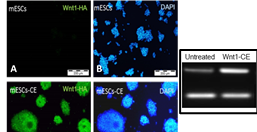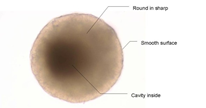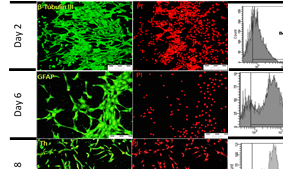-
Research Overview
My research group (Stem Cell and Neural Development, SCND, group) currently focuses more on establishing normal as well as transgenic stem cell lines for our downstream applications. One of our main interests is to understand the basic mechanisms involved in the differentiation process of stem cell, specifically the roles of a signalling molecule, Wnt, during neural differentiation process of mouse embryonic stem (ES) cell lines. This is taken as part of the in vitro animal model in an effort to understand the process in human brain development and to generate a high homogeneous population of specific neuronal subtypes. Inducible transgenics embryonic stem cell lines carrying Wnt and Wnt antagonist genes are used as the tools in understanding the role of Wnt/β-catenin pathway during this process (Figure 1).
Our great interest also goes to amniotic fluid stem cell (AFSC) studies as an alternative source of highly potent stem cells circumventing the controversial issues of ES cells. My group has managed to establish rat AFSC lines from full-term pregnancies, and is now on our way to ameliorating the effort for human counterpart. We are happy to observe that the rat AFSC lines are exhibiting a very promising differentiation potential into derivatives of the three primary germ layers, namely neurons, glial cells, pancreatic cells, chondrocytes, osteocytes, adipocytes and cardiomyocytes as well as their ability to form good quality embryoid bodies (EBs) (Figure 2,3).
Using molecular and cellular analyses of transgenic stem cell lines together with applying stem cell-derived neurons, my group is also aimed to establish in vitro models for neurodegenerative diseases such as Alzhiemer’s disease and Parkinsosn's disease. Recently, the group’s research interest has widened its scope into screening natural products for their neuro-protective, neuro-enhancement and neuro-regenerative properties using our stem cell models; on neurons differentiated from embryonic and amniotic fluid stem cell lines.
Overall, the group was established based on my area of specialization and interest which includes stem cell (fundamental and differentiation), neural development and molecular medicine.
Collaborators:
- John Mason of University of Edinburgh – Regulation of Wnt signalling during neural differentiation process of mouse embryonic stem cell lines.
- Thamil Selvee Ramasamy of University of Malaya – Hepatogenic differentiation of rat AFSCs
- Prof. Dr. Enamul Hoque of University of Nottingham – Nanofibers and wound healing using rat AFSCs.
- Prof. Dr. Sharida Fakurazi of Universiti Putra Malaysia – Wound healing using rat AFSC conditioned medium.

Figure 1: Overexpression of Wnt1 transgene upon induction with tamoxifen (4’-OHT) in transgenic mESC lines carrying inducible Wnt1-HA construct.

Figure2: Morphology of matured embryoid body (EB) generated from spontaneous differentiation of our newly establsihed rat AFSCs indicating high potency stem cells.
Figure 3: Neurogenic potential of our newly establsihed rat AFSCs.
Research Funding
Project Title Funding Source NEURO-ENHANCEMENT CAPABILITY AND NEUROREGENERATIVE EFFECTS OF PEGAGA (Centella asiatica) ON NEURONS DIFFERENTIATED FROM STEM CELL LINES MOA Generation of Human Amniotic Fluid Stem (AFS) Cells from Full Term Pregnancies: Prospective Cells for Therapy MOSTI E-Science Pluripotential capacity of stem cells/c-Kit positive cells derived from full-term amniotic fluid Fundamental Research Grant Scheme (FRGS) Unraveling the roles of Signaling molecules (Wnt) during neural differentiation process of mouse embryonic stem cells: a way of generating more neurons in vitro Fundamental Research Grant Scheme (FRGS) Isolation and characterization of pluripotent amniotic-fluid-derived (AF) stem cells. Research University Grant Scheme (RUGS) Selected Publications
Hamzah SN, Vidyadaran S and Nordin N . Differentiation of rat full term amniotic fluid stem cells into dopaminergic neurons phenotype via adherent and non-adherent neural induction protocols. Regenerative Research 3(2):140-141Hisham NAM, Ling KH and Nordin N. 2014 Establishment of conditional transgenic Wnt5a embryonic stem cell line Regenerative Research 3(2):137-139Muhammad KJ, Thilakavathy K, Zulida R, Yazid MN and Nordin N 2014 Primary culture of human amniotic fluid cells harvested from full-term pregnancies Regenerative Research 3(2):120-121Hoque ME, Nuge T, Yeow TK, Nordin N and Prasad RGSV 2015 Gelatin based scaffolds for tissue Engineering – a Review Polymers Research Journal 9(1):15-32Gao L, Abdullah S, Rosli R, Nordin N 2014 Neural Commitment of Embryonic Stem Cells through the Formation of Embryoid Bodies (EBs). Malays J Med Sci. 21(5):8-16
Awards
Year Name of Award 2014 Top Best Researcher by FMHS 2011 Best Service Award by UPM 2013 Best Poster Life Sciences And Best Micrograph for light microscopy,22nd MSM 2003 Graduate Student Fellowship,MOSTI 2010 Best Poster Life Sciences,19th EMSM 2010 3rd Best Poster,3rd MTERMS 2008 PRPI Silver Award,UPM Current Lab Members
Name Position Research Interest Year Joined -

Norshariza Nordin
[email protected]
603-89472650
Stem Cell Biology
